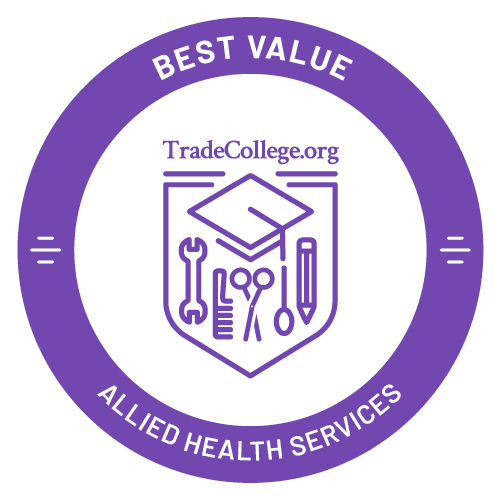Find Trade Colleges
2023 Best Value Allied Health Services Associate Degree Schools in Hawaii
Highlighting Quality Schools With More Affordable Pricing
Finding the Best Allied Health & Medical Assisting Services Associate Degree School for You
Allied Health & Medical Assisting Services is one of the most popular subjects to study in Hawaii. With 209 degrees and certificates handed out in 2021-2022, it ranked 3rd out of all the majors we track in the state.
It's not easy to decide which trade school program to enroll in when you have so many options available. You can choose a traditional brick and mortar school, or with the growth of online education, you can attend a school half-way across the country without even leaving your house.
To help you arm yourself with the information you need to make your decision, Trade College Search has developed this Best Value Allied Health Services Associate Degree Schools in Hawaii ranking. This report analyzed 2 schools in Hawaii to see which ones offered the best value associate degree programs for medical assisting students. The goal was to highlight schools with more affordable prices than others offering similar quality experiences.
Our ranking of value is based on the quality of a program as defined in our per sticker price dollar. Specifically, our score for quality is discounted by the published tuition and fees charged by the given college. This gives the cost per unit of quality for each college. The more quality your dollar buys, the better the value.
In our regional and nationwide rankings, out-of-state tution and fees are used in our calculations. For statewide rankings, we use average in-state tuition and fees.
Featured schools near , edit
2023 Best Value Allied Health & Medical Assisting Services Associate Degree Schools in Hawaii
The following schools top our list of the Best Value Allied Health & Medical Assisting Services Associate Degree Colleges.
Best Hawaii Schools for Affordable Quality for an Associate in Allied Health Services
Our 2023 rankings named Kapiolani Community College the best value school in Hawaii for allied health & medical assisting services students working on their associate degree. Located in the city of Honolulu, Kapiolani CC is a public college with a medium-sized student population.
Kapiolani CC undergraduate students pay an average of $3,284 in in-state tuition and fees each year. On average, medical assisting graduates from Kapiolani CC take out $11,149 in student loans while working on their Associate Degree.
Kapiolani CC also made our Best Allied Health Services Associate Degree Trade Schools in Hawaii list, coming in at #2.
Read full report on Allied Health & Medical Assisting Services at Kapiolani Community College
The excellent associate degree programs at Hawaii Medical College helped the school earn the #2 place on this year’s ranking of the best value allied health & medical assisting services schools in Hawaii. Hawaii Medical College is a small private for-profit school located in the city of Honolulu.
Hawaii Medical College undergraduate students pay an average of $26,037 in in-state tuition and fees each year.
Read full report on Allied Health & Medical Assisting Services at Hawaii Medical College
Best Value Allied Health & Medical Assisting Services Colleges in the Far Western US Region
Explore all the Best Value Allied Health & Medical Assisting Services Schools in the Far Western US Area or other specific states within that region.
| State | Degrees Awarded |
|---|---|
| Washington | 2,701 |
| California | 12,401 |
| Oregon | 882 |
| Nevada | 1,323 |
| Alaska | 191 |
Allied Health & Medical Assisting Services Related Majors for Medical Assisting
One of 11 majors within the trade school area of study, allied health & medical assisting services has other similar majors worth exploring.
Medical Assisting Concentrations
Most Popular Majors Related to Medical Assisting
| Related Major | Annual Graduates |
|---|---|
| Health & Medical Administrative Services | 88,600 |
| Practical Nursing & Nursing Assistants | 85,339 |
| Allied Health Professions | 83,905 |
| Health Sciences & Services | 36,762 |
| Mental & Social Health Services | 30,331 |
Notes and References
*These averages are for the top 2 schools only.
- The Integrated Postsecondary Education Data System (IPEDS) from the National Center for Education Statistics (NCES), a branch of the U.S. Department of Education (DOE) serves as the core of the rest of our data about colleges.
- Some other college data, including much of the graduate earnings data, comes from the U.S. Department of Education’s (College Scorecard).
More about our data sources and methodologies.


